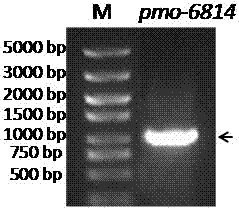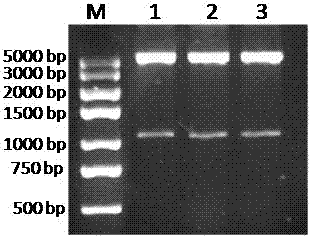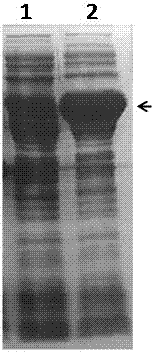A kind of thioether monooxygenase derived from Pseudomonas and its synthetic application
A technology of genetically engineered bacteria and coding genes, which is applied in the fields of chiral drug synthesis, monooxygenase gene cloning and recombinant protein expression, can solve the problem of low catalytic efficiency, lack of high enantioselective thioether monooxygenase, Unable to meet the problems of green industrial production
- Summary
- Abstract
- Description
- Claims
- Application Information
AI Technical Summary
Problems solved by technology
Method used
Image
Examples
Embodiment 1
[0028] Example 1. Acquisition of monooxygenase encoding gene
[0029] The genome sequence of Pseudomonas strain was analyzed, and a monooxygenase sequence with a length of 972 bp was determined. A pair of specific primers were designed to be amplified by PCR technology, and the full-length coding frame sequence of the gene was finally obtained. The specific method is as follows: using the extracted genomic DNA as a template, using primers F: 5'-actcGGATCCatgcagaccgttgaacacgaat-3' and R: 5'-accgAAGCTT
[0030] PCR amplification of gtaggctttgtcccagct-3'. The PCR reaction system is as follows: 12.5 ul of 2×TaqPCR MasterMix, 1 ul of genomic DNA, 0.5 ul of upstream and downstream primers, and 10.5 ul of ddH2O. PCR reaction conditions: 95 °C for 10 min; 98 °C for 10 s, 56 °C for 30 s, 72 °C for 90 s; extension at 72 °C for 10 min, 30 cycles. PCR products were tested by 1% agarose gel electrophoresis to verify whether fragments of the size of the target gene were obtained.
Embodiment 2
[0031] Example 2. Construction of monooxygenase gene expression vector
[0032]Using the pET32a(+) vector (purchased from Clonetech) as the backbone, a prokaryotic expression vector of the monooxygenase gene pmo-6814 was constructed. The specific method is as follows: the PCR product of pmo-6814 was recovered by DNA gel recovery kit, the PCR product and the vector pET32a(+) were double digested with the restriction enzymes BamHI and HindⅢ, and the recovered target fragment and vector were digested with restriction enzymes. . After ligation with T4 DNA ligase at 16 °C for 4 h, the ligation product was transformed into E. coli DH5α. After overnight culture, pick out the grown monoclonal colony and shake the bacteria and extract the plasmid. The recombinant plasmid was detected by double enzyme digestion with BamHI and HindIII. The positive recombinant plasmid pET32a-pmo-6814 was selected for DNA sequencing to ensure the sequence was accurate. Finally, the positive recombinant...
Embodiment 3
[0033] Example 3. Monooxygenase protein recombinant expression and detection
[0034] After the genetically engineered bacteria BL21(DE3) containing pET32a-pmo-6814 plasmid stored in glycerol was plated and activated, single colonies were picked in 3 ml of liquid LB medium containing corresponding antibiotics, and cultured at 37 °C with shaking for 12 h, and the next day. Transfer to 50 mL of fresh LB liquid medium containing antibiotics with 1% inoculum, shake and culture at 37 °C at 250 rpm with an OD600 of 0.6 (about 3 h), add IPTG with a final concentration of 0.5 mM, and induce culture at 25 °C at 160 rpm 8h. After induction, the cells were collected by centrifugation at 8000 rpm / min for 5 min, the cells were resuspended in PBS buffer, the cells were disrupted by ultrasonic, and the cell debris was removed by centrifugation at 15,000 rpm for 5 min. After heating at 100 °C for 5 min in a constant temperature metal bath, SDS-PAGE electrophoresis was performed.
PUM
| Property | Measurement | Unit |
|---|---|---|
| molecular weight | aaaaa | aaaaa |
Abstract
Description
Claims
Application Information
 Login to View More
Login to View More - R&D
- Intellectual Property
- Life Sciences
- Materials
- Tech Scout
- Unparalleled Data Quality
- Higher Quality Content
- 60% Fewer Hallucinations
Browse by: Latest US Patents, China's latest patents, Technical Efficacy Thesaurus, Application Domain, Technology Topic, Popular Technical Reports.
© 2025 PatSnap. All rights reserved.Legal|Privacy policy|Modern Slavery Act Transparency Statement|Sitemap|About US| Contact US: help@patsnap.com



